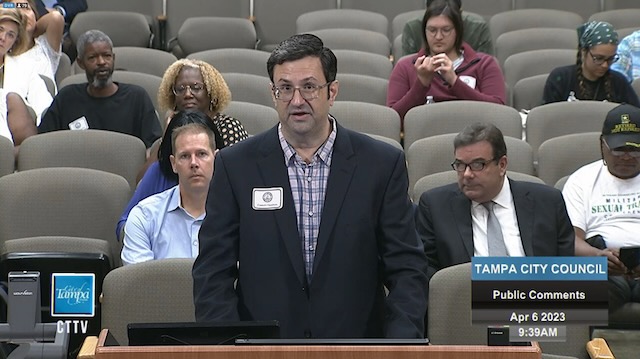As an ACLU of Florida volunteer, one of my favorite things to do is to get out in the community, explain our mission, and advocate for change. I got to do that twice recently.
Last weekend, I participated in a talkback session at “When the Righteous Triumph” at Stageworks Theatre. A few days ago, I spoke to the Tampa City Council about an initiative to make our Citizens Review Board more independent (which passed).
At Stageworks, someone listed everything going wrong in Florida and asked how she could help. I could tell she felt overwhelmed. I shared my personal view on this:
First, try not to focus on the entirety of the situation. Pick one organization or cause that resonates with you, and participate as much as you have time for — even if it’s just a few phone calls a month or showing up for a meeting.
Second, understand that no one will solve all these problems by themselves — if you think that way, you will be frustrated and burn out quickly. Think of yourself as part of a team, and do something that aligns with your strengths and makes you feel satisfied. Even a small effort makes a big difference.
And, third, wear pants when you’re going to be on stage. I was woefully underdressed on Sunday.

Where Passion Meets Usefulness
The conversation at Stageworks got me thinking: Why do I bother volunteering? I think it’s because I get to do good things by doing things I’m good at.
Here’s how to parse that sentence:
- I get to do good things: I get to help make our country more equal and just by protecting and advancing civil rights. I’m deeply committed to this cause — not just because I’m a gay man, but because I’m a human being.
- By doing things I’m good at: I can apply the experience and unique set of skills I’ve developed over the past [age redacted] years.
Put those two together, and you have a compelling reason to volunteer. Buddhist monk Jay Shetty would call this Dharma.
Everyone has a psychophysical nature which determines where they flourish and thrive. Dharma is using this natural inclination, the things you’re good at, your thrive mode, to serve others.
Jay Shetty, “Think Like a Monk”
The Indigo Girls put it this way:
If I have a care in the world, I have a gift to bring.
Indigo Girls, “Hammer and a Nail”
In my volunteer life, I’ve gravitated toward opportunities that play to my strengths. I’m not a lawyer or policy expert, but I certainly know how to solve problems, collaborate, develop strategies, explain things clearly, and create compelling narratives. One of the things I do best is craft messages that resonate with people, make emotional connections, and inspire action. That’s why I sat on the stage after the play and spoke to the city council.
By applying my skills, I’ve played a small but meaningful role in improving police accountability, restoring voting rights, reforming the criminal justice system, protecting free speech, and more. These have all been group efforts, and it feels good to know that I’ve contributed some knowledge and expertise that others might not possess.
Living at a Higher State
Another thing I have discovered is that volunteering improves my mental well-being. That seems counterintuitive, considering that it can be hard work, setbacks are frequent, and knowing that others suffer takes an emotional toll.
Psychologist Mihaly Csikszentmihalyi says serving others can create a state of flow — a state of mind in which people are engaged, involved, and perform their best.
Unfortunately, many people who move in the public arena do not act at very high levels of complexity. Politicians tend to seek power, philanthropists fame, and would-be saints often seek to prove how righteous they are. These goals are not so hard to achieve, provided one invests enough energy in them. The greater challenge is not only to benefit oneself, but to help others in the process. It is more difficult, but much more fulfilling, for the politician to actually improve social conditions, for the philanthropist to help out the destitute, and for the saint to provide a viable model of life to others.
Mihaly Csikszentmihalyi, “Flow: The Psychology of Optimum Performance.” Emphasis mine.
Again, Shetty would connect this to the concept of Dharma:
When your natural talents and passions (your varna) connect with what the universe needs (seva) and become your purpose, you are living in your dharma. When you spend your time and energy living in your dharma, you have the satisfaction of using your best abilities and doing something that matters to the world. Living in your dharma is a certain route to fulfillment.
Jay Shetty, “Think Like a Monk.” Again, emphasis mine.
This Dharma stuff sounds great. Perhaps I should become a Buddhist. But for now, I’m satisfied just being a volunteer.
Some Advice
It’s easy to become a volunteer, but it takes some effort to volunteer in a way that makes you feel valued and impactful. Here are some tips:
- Find a cause you’re really passionate about: Relevance will make your work more personal and meaningful.
- Shop around: There are dozens — maybe hundreds — of organizations dedicated to your cause. You don’t just have to go with the biggest and most famous ones.
- Consider the culture: If you don’t click with an organization, find another one. You don’t want to feel isolated, unmotivated, or disengaged.
- The most important thing you can volunteer is your time: Money buys stuff. People create value and make an impact.
- Make it a learning experience: When I joined the ACLU, I was able to use and improve professional skills that I couldn’t at work — especially leadership skills. Doing so helped me advance my career.
- Don’t overcommit, and feel free to say no: If you don’t set boundaries, you might find yourself in over your head. You can also say that you’re not ready for something yet. I turned up some volunteer leadership positions until I felt ready to take them on.
- Take care of yourself: If you’re emotionally or mentally exhausted, you have burnout. Take a step back until you’re ready to give your all again, and do not feel guilty about it. This is the most important piece of advice I can give you.
